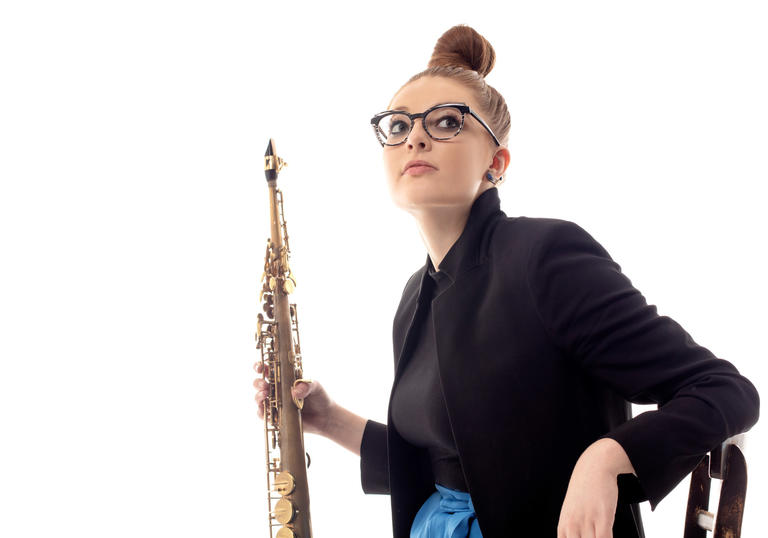
Programme and performers
Meredith Monk Early Morning Melody (trans Simon Parkin)
Philip Glass Melody for Saxophone No 10
Luke Howard Dappled Light
John Harle RANT!
Barbara Thompson The Unseen Way
Georg Philipp Telemann Sonata in F minor (trans Simon Parkin)
1. Triste
2. Allegro
3. Andante
4. Vivace
Ayanna Witter-Johnson Lumina
Kurt Weill Je ne t'aime pas (arr Paul Campbell)
Chilly Gonzales Overnight (arr Simon Parkin)
Astor Piazzolla 'Bordel 1900', 'Café 1930' and 'Nightclub 1960' from Histoire du Tango (arr Simon Parkin)
Performers
Jess Gillam saxophone
Zeynep Özsuca piano
Sam Becker double bass
Artist biographies
Hailing from Ulverston in Cumbria, Jess Gillam is animating the music world with her outstanding talent and infectious personality. She has been forging her own adventurous path since she shot to fame becoming the first saxophonist to reach the finals of BBC Young Musician and the youngest ever soloist to perform at the Last Night of the Proms.
As well as performing around the world, Jess is a presenter on TV and Radio. She became the youngest ever presenter for BBC Radio 3 with the launch of her own weekly show, This Classical Life.
Jess is the first ever saxophonist to be signed exclusively to Decca Classics and both of her albums reached No 1 in the UK Classical Music Charts. She has been the recipient of a Classic BRIT Award, has been nominated for The Times Breakthrough Award and was awarded an MBE in the Queen’s Birthday Honours list 2021 for Services to Music.
A free spirit in style and character, Jess is an advocate for the power of music in society. During lockdown she formed her ‘Virtual Scratch Orchestra’, inviting musicians of any standard to come together to play music virtually with her. Jess is a patron for Awards for Young Musicians and London Music Fund and enjoys working and performing with young musicians.
She has performed in prestigious concert halls and with world-class orchestras around the globe including the NDR Hannover, Gothenburg Symphony Orchestra, Iceland Symphony Orchestra, Minnesota Symphony Orchestra, Munich Philharmonic, Lahti Symphony Orchestra and the UK’s leading orchestras.
Jess is currently Artist in Residence at the Wigmore Hall, a European Concert Hall Organisation (ECHO) Rising Star which sees her performing at many of the top concert halls across Europe, and she continues to promote her own concert series, bringing international talent to her hometown of Ulverston.
Jess is a Vandoren UK Artist and became the youngest ever endorsee for Yanagisawa Saxophones aged just 13.
